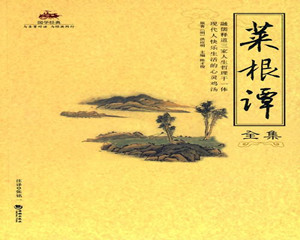《菜根谭》是明朝还初道人洪应明收集编著的儒家经典,是一部论述修养、人生、处世、出世的语录集。 其文字简炼明隽,兼采雅俗,言辞中流露出山林意趣,渗透着万物一体的世界观。开出的处世之方偏重心态和人事,悟虚妄真实之理,指出贫富、尊卑、穷达因为心念使善恶、祸福相互转换,告诫世人及时转念,戒贪少欲,取中庸之道。著作前后内容和深度有所不同,反映出了不同的阅历和境界。

《菜根谭》(美味快意、享用五分)
爽口之味,皆烂肠腐骨之药,五分便无殃;快心之事,悉败身丧德之媒,五分便无悔。
Tasty foods are like poison that perforates your intestines and erodes your bones. So long as you only eat until you are half full no harm will ensue. Pleasure seeking damages your body and morality. Enjoy a little bit of it, and you will have no regrets afterwards.
(保罗·怀特 译)
Foods agreeable to the taste are all like drugs which are liable to hurt intestines and stomach; but if you assume only half of them they will do you no harm. Things pleasant to the mind are all media which easily bring forth disgrace and ruin; but if you go only half way in the enjoyment they will invite no regret.
(周文标 译)
Dainty foods are all poison that corrupts intestines and bones, but they will do no harm if you only make yourself half full; gratifying things are all agents that lead to physical and moral ruin, but they will bring no regret if you only seek partial gratification.
(蒋坚松 译)
Tasty foods can rot my bowels and decay my bones. In moderation, however, they are not very harmful. Taking pleasure in congenial activities can crush my reputation and destroy my virtue. In moderation, however, they are not cause for regret.
(Robert Aitken & Daniel W. Y. Kwok 译)
更多精品翻译素材,敬请关注可可英语。












